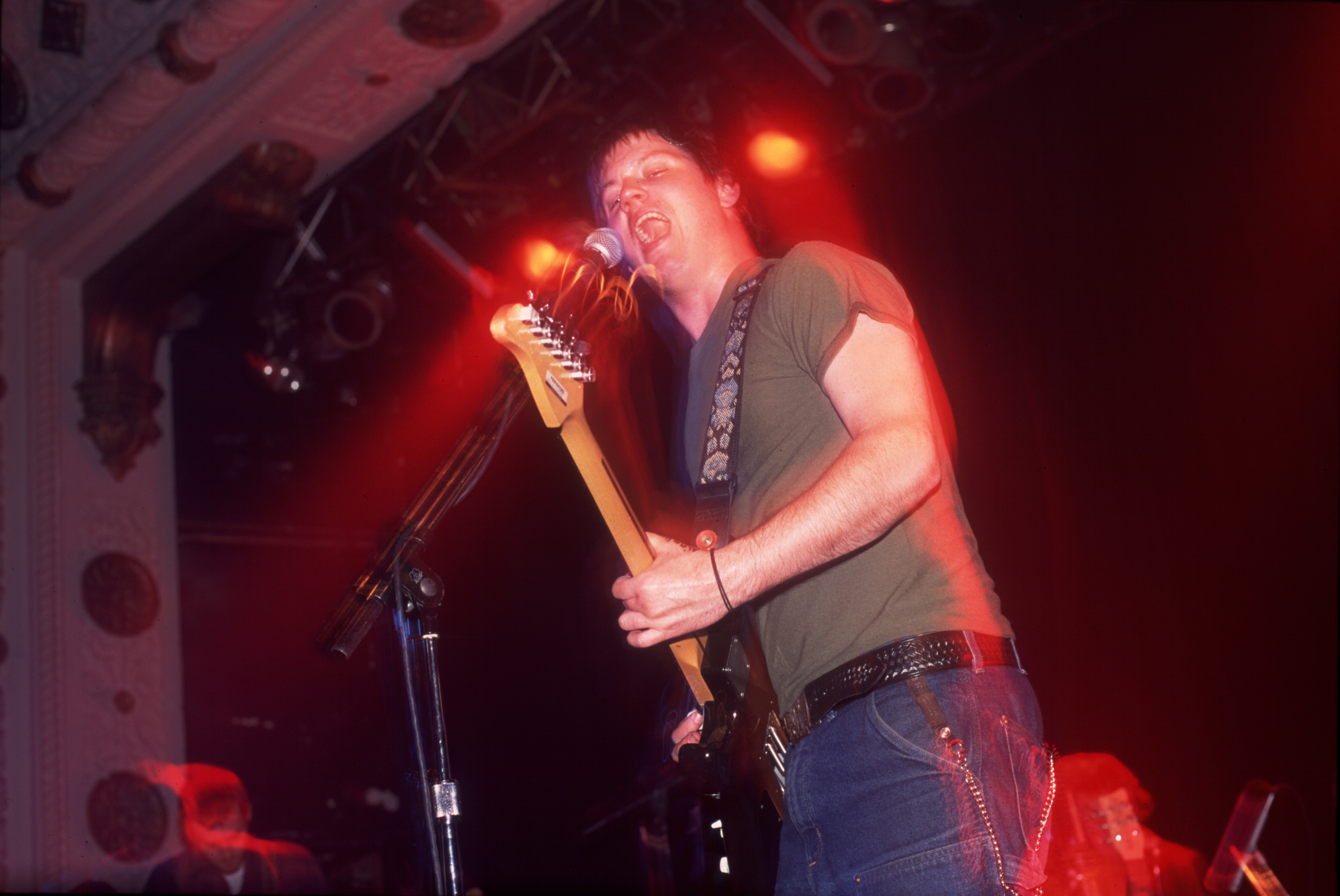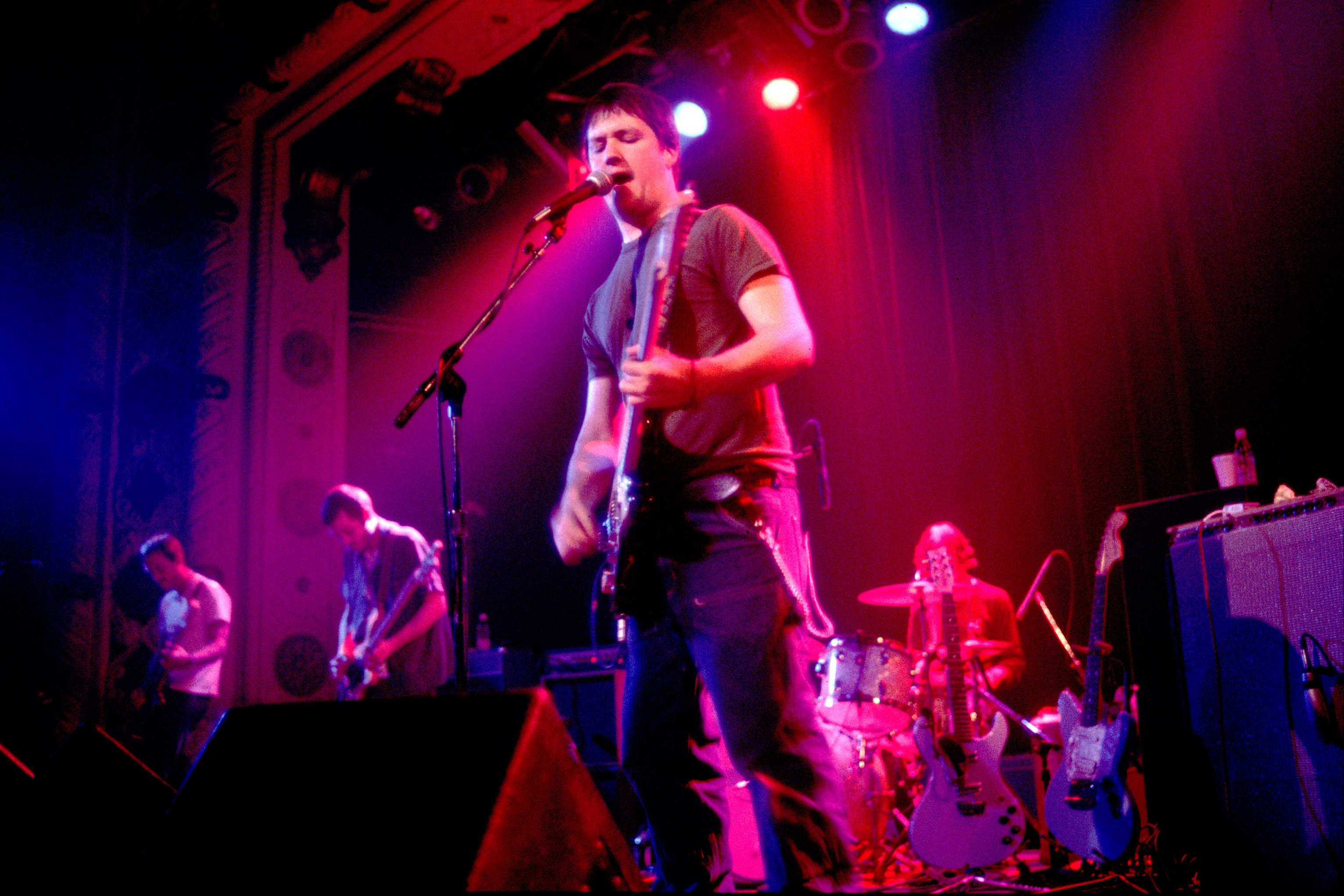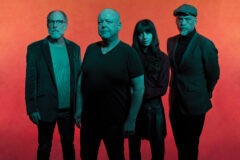Full Moon: The Sessions
Jeremiah Green: [Eric] and I drove out to Chicago together to do our part of that recording. We had this apartment above the studio. There were three rooms: Isaac and his girlfriend were in one; Eric and I in one; this dude Ben Blankenship [in another].
Brock: He was this dude from around town who claimed to know how to play a lot more things than he did. Or maybe he just didn’t know how to incorporate them into what we were doing. The band was a little free-form as far as people coming and going. It wasn’t something we really thought about much, like, “We’re adding a new band member!” and chiseling their name on the fucking foundation in stone.
Green: Ben would get extra creative, to the point where people would be like, “What are you doing? You’re wasting our time.” But the end result would be this cool thing. I remember [on “Paper Thin Walls”], he tuned up like five guitars to different chords so he could play this part on each guitar. It’s just this simple part that happened twice. These days, we have more of a budget and time to do stuff like that. But at the time, it was like, “We’re gonna take three hours to record this one part of the song?” It seemed wacky. But it was cool.
Brock: He’d just walk by and play each note, and it would ring out. That’s the one thing I remember him doing that I thought was great.

The band wrapped basic instrumental tracking after roughly three weeks. But the sessions were temporarily derailed when Brock was punched in the face in a local park, breaking his jaw. That incident — which seems to have inspired the ragged, unreleased song “Jawbreaker,” played live once in 2001 — also marked a pivotal creative shift.
Deck: It was a real changing point. It was the first day of recording real vocals. I went home, and Isaac and a couple other people went to The Empty Bottle. They came home late to the apartment and parked his van next to the city park across the corner. It was very late at night, and he struck up a conversation with some people. Someone punched him in the jaw and broke his jaw. He was certainly not picking a fight. I believe he was actually trying to do the opposite — just chill them out and say hi.
Brock: Territorial pissings, man. Bigger cities are almost like rural communities in their own ways — your neighborhood is your fucking neighborhood. The local kids were very possessive of their spot. Outsiders were pummeled. I wasn’t the only guy who got his ass kicked in that park. They didn’t want a bunch of fuckin’ weirdos in their neighborhood. I didn’t read the room right. I showed up from drinking, and I walked over and was gonna say hi. I got as far as saying, “Hey, how are y’all doing?”, and out of the corner of my eye, I saw [something] hit my head like a big golf ball on a tee.
It was one of the few times [I experienced] that thing people talk about where time literally slows down. They were throwing bottles. There were like 15 of them coming in my direction. I remember I would move my head to the left or right and a bottle would slo-mo by. It was a really good punch; my hat’s off to the fella. That neighborhood has one of the leading Golden Glove boxing establishments. Those kids know how to hit someone. My mind hadn’t kicked into, “Also they might just kill me.” But I knew I didn’t want any more of what I just got. [They yelled] “Fuck you, cowboy!” I remember being like, “Cowboy?” I looked down and was like, “I’m wearing a Western shirt. I guess not everyone wears Western shirts.”
Deck: I didn’t find out until the next morning that he went to the hospital and had surgery and they wired his jaw shut. I believe his jaw stayed wired shut for six weeks.
Deck: I made him rough mixes onto a cassette tape, and he listened and listened in the hospital. I think that’s when he decided it wasn’t done. I don’t know if it didn’t fulfill a vision he had or if he had a greater vision for what it could be. The record we’d made up until that point was more production-y than their previous records — there were more layers already. But there was nothing near the amount of guitars and vocals that ended up on the finished product. When his jaw was still wired shut but his energy had returned and he felt OK again, he said, “I think we’re not finished with this instrumentally. I’d like to get back in there and keep recording.” I remember him telling me this in the kitchen of my apartment. I said, “Are you sure? Wow. I thought we worked really hard on that and nailed it.” He said, “I think there could be a lot more.” That’s when we started to turn it into the record that it is.
Rutili: I think having all that extra time waiting for his jaw to heal made the record better.
Brock doesn’t recall having a creative epiphany in the hospital. Instead, the album’s guitar-heavy sound developed from a more practical place.
Brock: I felt like it needed a lot of work. Once I got my mouth wired shut, singing kinda wasn’t an option. I was stuck inside — the folks who broke my jaw were looking for another shot at it. I wasn’t able to work on vocals, so I spent a lot of time just adding shit.
Deck: I may have expressed a little skepticism at the beginning. I can tell you one anecdotal story that makes me think that: We had been trying to get “The Stars Are Projectors” for most of a day during those first three weeks. The band just wasn’t feeling it for whatever reason. I remember someone saying, “It’s too early in the day to play a song like this.” I remember someone saying, “It’s hard to play a song like this when you’ve played it so many times in a row.”
I seem to remember it was like 8 p.m. I said, “Let’s turn the lights down, adjust our attitudes and try this thing one more time. If we don’t get it, we’ll just call it a night.” We did that, and they did the performance that’s on the record. My jaw was on the floor. It was just fucking amazing. They nailed it. I thought to myself — as it was happening, and again, as we listened back in the control room — that it really encapsulates the entire production. Whatever this song could become, it doesn’t need any accoutrements, any ornamentation. Even the scratch vocal, I thought, could be the final vocal.
Brock: I remember that when we got it, it didn’t require any editing. We just fucking did it.





